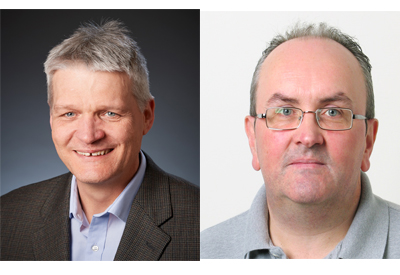Advancing Power Quality: Fluke’s Hilton Hammond and Frank Healy

May 18, 2018
 By Owen Hurst
By Owen Hurst
As our population grows and consumers continue to rely on technology for both essentials and comfort, the need for power quality has become vital. Fluke is a leader in this field, offering power quality training seminars, as well as employing power quality specialists with years of industry experience.
This month’s personal profile is a double feature of two of Fluke’s senior power quality specialists, Hilton Hammond and Frank Healy.
Hilton Hammond has been with Fluke since 1995, and in 2013 moved into his current position as Power Quality Business Unit Manager. He has a deep and thorough knowledge of power quality and related electrical instrumentation.
Frank Healy, Power Quality Product Marketing Manager at Fluke since 2006, has been in the industry for well over three decades. He globally manages Fluke’s power quality products, including measuring instruments and precision power analyzers. Frank’s lengthy career has allowed him to witness the progression of the industry, and he has long worked at raising awareness and understanding of power quality. He notes that it is really about the customers, and to serve them electricians need the right training and tools.
Frank relates that power quality is not a new thing, it has been around for quite awhile but we are currently seeing a proliferation of products that present new challenges and opportunities. New products have a much wider distribution through the residential, commercial and industrial markets than previously, requiring all industry professionals regardless of specialization to understand power quality. That’s what led Frank to get involved in power quality training and consulting.
Frank’s career has given him unique ways of looking at the evolution of electrical systems and the necessity of power quality. He cites as an example hospitals, which are like small towns in that they have different areas and divisions that have not always communicated or been aware of each other. System integration has changed this, so that systems are now talking to each other. The technology and the integration process have affected power quality. Locating power quality issues in large connected systems like modern hospitals requires extensive training and understanding of both power quality and system integration.
When asked about the importance of power quality training for apprentices and new electricians, Frank points out that power quality should be part of the basic education for new electricians. He goes on to explain that power quality is largely taught in a theoretical manner, and that many of the effects of power quality are explained in a piecemeal way that doesn’t always deliver a complete understanding. A greater focus on power quality training will help new professionals recognize how electrical systems act. Frank puts emphasis on how important it is to understand systems as a whole and not piece by piece, especially with continuing developments in system integration. Many Fluke products enable users to identify power quality issues in specific areas of integrated systems simply and quickly. Fluke’s focus on power quality training and tools are all about making it easier for electricians to accurately identify and correct power issues.
Hilton provided a unique way of explaining this issue for new electricians and electrical engineers. He notes that It is important for them to think of electricity as the lifeblood to modern machines. They need to understand the quality of the electricity flow and what characterizes the good and bad in it. Once we understand that the flow feeds the entire system decisions can be made about the performance of each machine and how it is effected by the electricity flow through it and then the system as a whole.
Hilton stresses that there is not enough understanding of power quality in the industry, and there needs to be more emphasis on training and consulting. He points out that Frank and his team spend countless hours providing training and consulting services to customers and that Fluke has developed specialized power quality training courses.
When questioned about how emphasis on power quality in Canada compared to the rest of the world, both noted that power quality problems are fairly evenly distributed across the globe. They pointed out that what typically affects emphasis on power quality are things like use of natural resources and social pressures. For example, Germany faces far more internal social pressure regarding their carbon footprint than China. Further, governments like Canada’s, which offer incentives to be greener, are advancing our ability to minimize our carbon footprint. Power quality is a big part of that green initiative.
To finish up, Frank relayed a recent story he heard when catching up with another power quality specialist. The individual went to look at a transformer in a factory that he heard was making a significant amount of noise. He hadn’t been called specifically to check the issue, just heard in passing and went to take a few measurements to find the source of the noise. After taking some measurements he found that the 3, 9, 15 harmonics that sum up in the neutral conductor were immense. The conductor currents in the neutral were almost the same as the 3-phase conductors and when he went to test the conductor it was so hot he was unable to carry out the test. Frank points to this as the strong physical effect that power quality issues can have, and how obviously hazardous situations like this can be.
As a last word, Hilton points out how in such a busy industry it is easy to get caught up in work but that it is important for industry professionals to look up now and then and continue to learn and stay ahead of advancing technology.
Owen Hurst is Managing Editor of EIN’s sister publication, Panel Builder & Systems Integrator: http://panelbuildersystemsintegrator.ca



